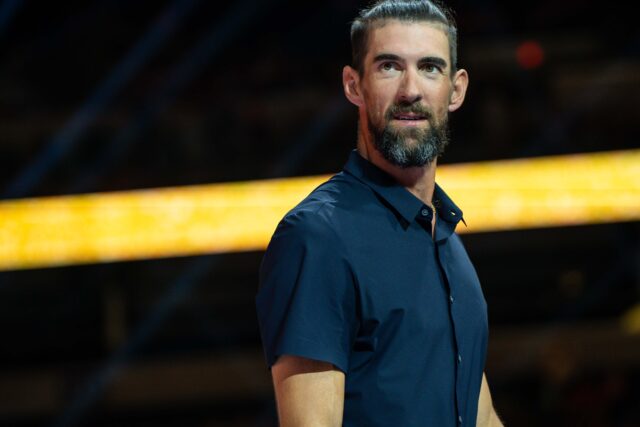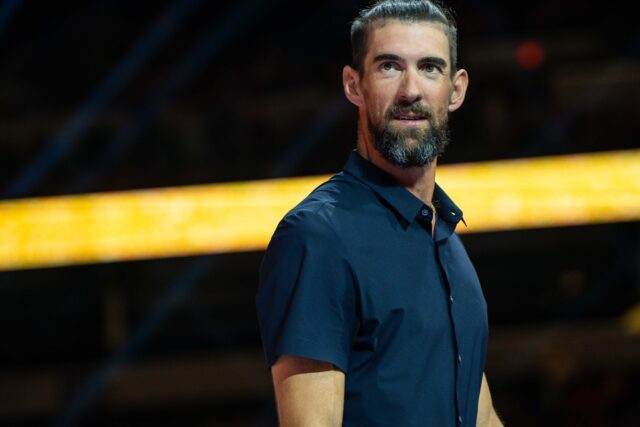By Sean Griffin on SwimSwam

Twenty-three-time Olympic gold medalist Michael Phelps has released a public statement criticizing USA Swimming’s leadership, and is calling for major organizational changes.
In his statement, Phelps argued that “poor leadership” and weak “operational controls” have created systemic problems over the past nine years. He revealed that he and other past Olympians had previously sent concerns to USA Swimming officials earlier this year, but received no meaningful response.
Phelps also addressed the culture of silence, saying he “was told to be grateful for the chance to compete and that it was more important to stay quiet and to keep the peace.”
Now speaking out publicly, Phelps expressed doubts about whether he would want his own sons competing at elite levels given the sport’s current state.
The 40-year-old, who has been fully retired from competing for the past nine years, called for full transparency from the organization in its operations, streamlining athlete services, and a new approach to the grassroots level of the sport to rebuild what has been in decline in the last five years.
See his full statement below.
While I’ve faced some pushback, from the post I shared last week, most of the feedback I’ve heard echoes my feelings about the challenges facing USA Swimming today. And although some of you may not agree with my perception, I’m glad that this discourse is forcing a bigger conversation.
Now is the time to have it.
First, I must be clear that I have the utmost respect for the U.S. swimmers that competed at the World Championships. My criticism is in no way directed at them – I know how hard they work and how honored they are to represent the U.S. National Team. My criticism is about the system, its leadership, and how it’s failing.
There have always been cracks in the system but in the last nine years, I’ve seen those cracks grow. In 2016, I had the honor to be a part of a U.S. swim team in Rio that was arguably the most successful in the sport’s history and we won 57% of the medals we had the opportunity to win. Fast forward eight years to Paris, where Team USA won only 44% of the medals they had the opportunity to win in the pool, the lowest percentage the sport had seen since the 1988 Olympics.
I’ve asked myself what’s changed in our sport and the answer is clear…this isn’t on the athletes as they continue to do the best they can with what they’ve been given. This is on the leadership of USA Swimming. Poor leadership trickles down and can impact an organization at every level.
I spent most of my life inside of a system that is supposed to support athletes. I gave it my everything, but I often felt that my voice went unheard. I was told to be grateful for the chance to compete and that it was more important to stay quiet and to keep the peace.
I spoke up earlier this year when I sent a letter to USA Swimming. It was also shared with the United States Olympic & Paralympic Committee. It addressed many of my frustrations with the current state of the sport and was signed and supported by former Olympic medalists, world record holders, members of the coaching community, and current and previous staff members of USA Swimming.
That letter seemed to fall on deaf ears. No one really wants to talk about how broken USA Swimming has become.
But, if we don’t talk about it, it won’t get fixed.
Money is a factor. But poor operational controls and weak leadership are a cornerstone of the sport’s problems.
I’ve watched too many teammates struggle to compete in a sport they love without the support they need. I’ve also seen the sport struggle to return its membership numbers to pre-pandemic levels, and I’m done pretending this system works just because it produces medals.
Swimming to me was always about more than just medals – it’s supposed to be an environment that builds champions in and out of the pool.
As a Dad to four young boys, it pains me to say that I’m not sure I’d want my sons to be a part of this sport at a competitive level. Yes, swimming changed my life, but it also causes a lot of heartache, and its current state makes me both sad and angry.
I want to see this sport flourish and I want to be a part of the solution. I’ve always said that I wanted to change the sport of swimming in the U.S. and that sentiment still holds true.
I still care and I’m not ready to give up.
I don’t have all the answers, but I know this: we need accountability. We need transparency. We need athlete voices at the center, not in the margins.
We need systemic change.
I would like to encourage those of you who are in our sport and all of those who care about our sport’s future to share your thoughts too. What do you think about the state of swimming in our country today? Has the sport continued to evolve and, if not, what can be done to move this sport into the future? I’d love to see open and honest feedback from others.
As an initial step forward, I would propose the following next steps to the USA Swimming Board of Directions and USA Swimming staff:
- Commission a 360* independent review of USA Swimming’s Board of Directors and its organization as a whole. Provide complete transparency in this process.
- Streamline athlete services and develop a proactive, athlete-first way to support athletes competing in the sport. While USA Swimming and the USOPC provide some athlete resources, there needs to be a better way to work directly with athletes to implement what’s available to them.
- Focus on strengthening the grassroots level of the sport, reversing its pandemic membership decline while developing new ways to foster additional growth.
I offer up my service to be a resource in these proposed initial steps and I am hopeful that the USA Swimming community will accept my offer.
My door is open and there is work to be done.
Sincerely,
The public tension between USA Swimming and Phelps began on August 1, when he and Ryan Lochte expressed their frustration with Team USA’s performance at the World Championships in Singapore by posting a meme on Instagram.
Less than a day later, in this post on the @swimcellys page, which highlights post-race celebrations from the sport, Phelps responded to a clapback from fellow Olympic gold medalist Lilly King. SwimCellys posted a screenshot of a Lilly King Instagram story that said “y’all been real quiet tonight
In response, Phelps commented:
We should be so proud of how the team swam as a whole …. Right?
Apologies for having higher expectations for the leadership of the team. My opinions were way off. USAS has what they finally want, me to “stay in my lane”. They will continue to help the kids reach childhood dreams by their continued support
In the midst of that, Rowdy Gaines, the voice of swimming in the United States via his work as the sport’s primary television analyst, has also made several public statements criticizing USA Swimming.
USA Swimming responded to the public criticism from Phelps, Lochte and Gaines with interim CEO Bob Vincent releasing the following message late last week:
We respect and value the opinions of Rowdy, Michael, Ryan, and all USA Swimming alums. We acknowledge that their comments come from a place of passion and genuine desire to see USA Swimming succeed. We are saddened and disappointed at the timing of the comments. The USA Swimming team battled severe illness in Singapore, and these comments added public scrutiny to an already challenging situation for our athletes and coaches. We are incredibly proud of the resilience of our team in the face of such difficult circumstances and remain confident in the leadership, strategic direction, and culture established by newly appointed National Team Managing Director Greg Meehan. USA Swimming has reached out directly to Rowdy and other notable alums in recent months, offering them a forum, including an invitation to join in a more official manner. The door remains open, as the only path forward for our sport is to work collectively to achieve a shared vision of success. We remain focused on the task at hand: winning LA28.
While behind the scenes, Phelps has long expressed frustration, Team USA’s performance in Singapore, where a gutsy performance by the women’s team salvaged a finish atop the medals table, seems to have been the push over the edge for him to engage more directly and publicly.
It has been 349 days since USA Swimming CEO Tim Hinchey resigned, and 166 days since his would-be replacement Chrissi Rawak did the same after it leaked that she was the subject of an investigation by the U.S. Center for SafeSport.
Read the full story on SwimSwam: Phelps Pushes Back On USA Swimming, Releases Statement Despite Being Told To “Stay Quiet”



